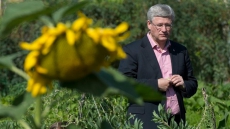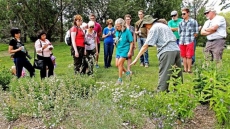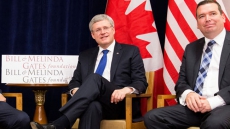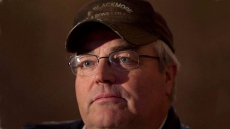IRBIL, Iraq - Moments after climbing into a bunker manned by Kurdish Peshmerga fighters, Foreign Affairs Minister John Baird looked behind him and gestured, saying, "Paul and Marc, come on."
Seconds later, amid the sandbags, Kurdish fighters and media cameras, he was shoulder to shoulder with two of his toughest political opponents — Paul Dewar and Marc Garneau, the foreign affairs critics for the NDP and Liberals.
Together, they gazed out at a blip on the horizon, about 150 fighters from the extremist Islamic State in the Levant, or ISIL, hunkered down a kilometre away across the desolate northern Iraqi plain.
The two opposition MPs joined Baird this week on his two-day, 26-hour trip to Iraq. Throughout their frenzied dash through the palaces and political offices of Baghdad and Irbil, the heavily armed checkpoints, the sun-baked refugees camps as well as this front-line bunker, the often-combative foreign affairs minister ensured that Dewar and Garneau were literally at his side.
More than any other moment, Baird's front-line photo-op symbolized the axiom that domestic politics ought not to be mixed with foreign affairs — the notion encapsulated in the aftermath of the Second World War by U.S. Republican Sen. Arthur Vandenberg: "Politics stops at the water's edge."
In many ways, the one-voice approach seen in Baird's Iraq trip was a marked departure from how the Harper government has generally conducted international relations. The Tories have faced wide criticism for using the world stage to further their own domestic political goals — in particular, attempting to curry favour with large diasporas from Sri Lanka or Ukraine that might be able to deliver votes in key urban ridings.
Canada has the largest population of ethnic Tamils outside of Sri Lanka, with 300,000 living mostly in and around Toronto. Prime Minister Stephen Harper boycotted the most recent Commonwealth leaders' summit in Sri Lanka because the Colombo government wouldn't agree to an independent international investigation into allegations of war crimes committed by its military against Tamil rebels at the end of the county's 27-year civil war. The fact that groups such as Human Rights Watch praised the government for this stand did little to mute the criticism.
Baird and the Tories were heavily criticized this spring when they left the opposition out of a trip to Kyiv as the Ukraine crisis continued to boil. There are about 1.2 million Ukrainian-Canadians and many analysts note that the Conservative's unapologetic, pro-Ukraine, anti-Putin stance can't help but stand them in good stead at the ballot box.
Brian Mulroney blasted Harper's foreign policy this week in an interview with CTV's "Power Play." The former Progressive Conservative prime minister has repeatedly critiqued the current government's foreign policy, and he again suggested it needs to be more inclusive.
"We're in the big leagues ... so we have to conduct ourselves in that way. We can't be out-riders."
Still, there have been signs, especially from Baird, that the Tories are willing at times to reach out. Garneau joined Baird at a recent Jewish community centre rally in Ottawa to show support for Israel during the Gaza bombardment. Dewar was noticeably absent (the NDP said he had a scheduling conflict), but Garneau and Baird openly celebrated their non-partisan solidarity by affirming their support for Israel.
In that light, Baird's decision to bring Dewar and Garneau to Iraq this week would not appear that surprising.
Indeed, both politicians welcomed the overture and the opportunity to see a major international crisis from very close range.
For Dewar, it was his second trip to northern Iraq. He travelled to Irbil on his own in 2007.
This time, he said, "essentially this is a multi-partisan trip to assess what's happening in Iraq, to assess what Canada can do. We're going to make some recommendations on what the government should be doing."
Garneau said that in all of Baird's official meetings the minister allowed both him and Dewar to ask questions of Iraqi politicians.
"So that was very much appreciated," Garneau said.
"From the Liberal perspective, we all have the same interests here," he added, calling ISIL "a scourge."
The show of unity was a perfect fit for the core message that Baird was trying to deliver to his Iraqi hosts: that Iraq's new central government, which formally assumes office on Sept. 11, must break with the past and become more tolerant and inclusive and rise above sectarian differences.
Nouri al-Maliki was forced to step down as prime minister last month in the face of intense political pressure after eight years in office.
Al-Maliki was widely accused of alienating Iraq's Sunni minority by pushing a pro-Shiite political agenda that likely helped sow the seeds of ISIL's deadly insurgency and atrocities.
Will the united foreign-policy front last? The Canadian delegation had barely departed Iraq when the non-partisan goodwill was put to the test. Harper announced he would be sending dozens of military advisers into Iraq — a call that the opposition argues should be put to Parliament for discussion before they give it their blessing.
Though Canada's internal political wars are heated and increasingly bitter, they are no match for the deep hatreds that threaten to rip Iraq apart.
The face of Baird that Iraqis saw just before he left Iraq was not the one politicians and the public are used to seeing in Canada.
Off the top of his closing press conference in Irbil, Baird said a round of thank yous.
"I'm also very pleased to be joined by representatives of both the other political parties in Canada," the minister added.
"I think we speak with one voice: we abhor the barbaric terrorist activity we see in the region and we really want to come and personally stand with you and the people of this great country."





